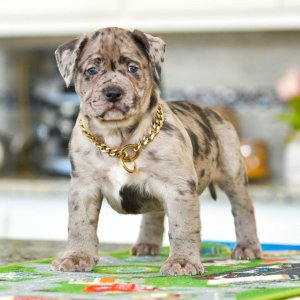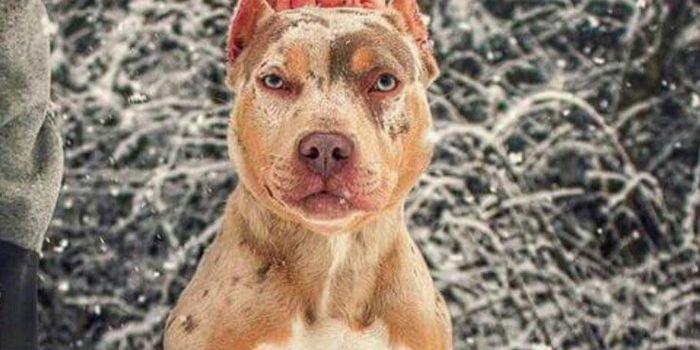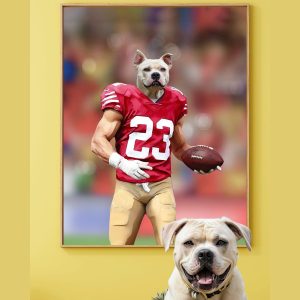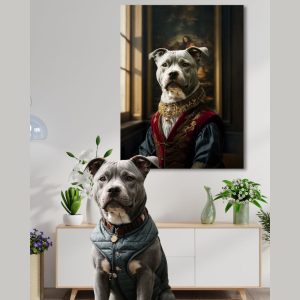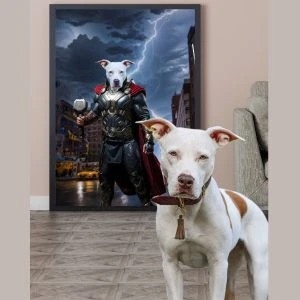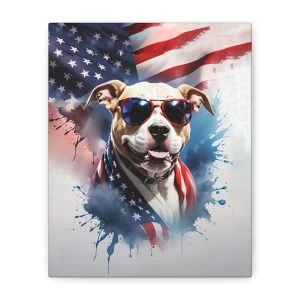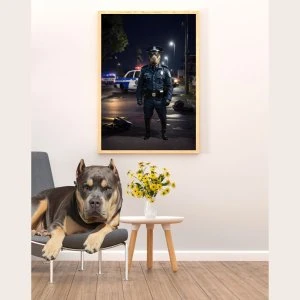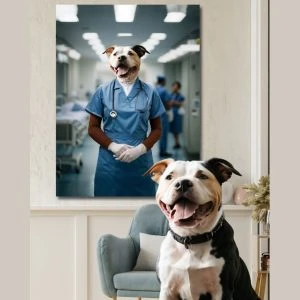Leopard Pitbull Vs Leopard Bully
Understanding Their Unique Characteristics and Differences
In the world of dogs, two beautiful breeds have consistently captured attention – the Leopard Bully and the Leopard Pitbull. Their eye-catching coats combined with their spirited yet affectionate personalities have made them favorites among canine enthusiasts. But to truly appreciate these breeds, we must understand their distinguishing origins, attributes, and characteristics.
Defining the Leopard Bully Breed
The Leopard Bully boasts a rich history stemming from various bulldog and terrier breeds. Their lineage and selective breeding have produced a loyal companion with a distinctive leopard coat.
Origins of the Leopard Bully
Bulldogs, with their courageous working roots in medieval England, contributed their sturdy muscular build and pushed-in face to the Leopard Bully dog. Their history traces back to bull baiting in the 1100s. After that brutal sport was outlawed in the 1800s, Bulldogs were bred to have a more docile temperament but maintained their power and brachycephalic structure.
Terriers, originally bred for vermin hunting and guarding, lent their energetic temperament and agility to the breed. Feisty terriers like the American Pit Bull and Staffordshire Bull Terrier were influential in shaping the Leopard Bully dog.
Modern selective breeding starting in the 1980s emphasized the breed’s distinctive spotted coat patterns and sociable, relaxed temperament. The Leopard Bully was recognized by the International Bully Coalition in 2004.
Physical Appearance of Leopard Bullies
- Robust, muscular build – Sturdy and substantial with a broad head, strong jaw and pronounced cheeks. Males range from 70-120 lbs.
- Coat colors and patterns – Short, smooth to slightly wavy coat that comes in a variety of colors and patterns including brindle, fawn, blue, and of course – leopard.
- Distinctive leopard pattern – Coat features reddish brown spots of varying sizes overlaying a white base. The degree of spotting varies between individual dogs.
Leopard Bully Temperament
Despite their imposing physique, Leopard Bullies have a gentle, affectionate nature. As Julie, a Leopard Bully dog owner, describes:
“These dogs really are gentle giants. My Leopard Bully adores our children but also makes a great guard dog – his bark alone scares off any threats.”
- Loyal and social – Form very strong bonds with their human family. Thrive on companionship. Prone to separation anxiety if left alone for long periods.
- Relaxed temperament – Typically docile and mellow when properly exercised and stimulated. Require at least 30-60 minutes of daily activity.
- Kid-friendly – Do very well with children thanks to their patience and gentleness. Still require supervision like any breed.
- Courageous guard dogs – Their loyalty and alertness make them excellent watchdogs who will protect their family. They have a formidable bark that deters intruders.
What is a Leopard Pitbull?
The Leopard Pitbull is a handsome offshoot of the American Pitbull Terrier made distinctive by its leopard-spotted coat.
History of the Leopard Pitbull
The Leopard Pitbull shares the history of the American Pitbull Terrier, which has its roots in 19th-century England. Bred from Old English Bulldogs and various local terriers, Pitbulls were valued for their strength, athleticism, and versatility – from farm work to companionship.
With immigration, these dogs spread to America where they were favored by ranchers and farmers.
Selective breeding efforts focused on accentuating the breed’s distinctive leopard coat pattern while maintaining typical Pitbull loyalty, trainability, and people-focused temperament.
Appearance of Leopard Pitbulls
- Athletic build – Agile and graceful physique, more lean and toned than bulky. Males 50-90 lbs.
- Short, glossy coat – Coat length is short, smooth and shiny. Does not require extensive grooming.
- Distinct leopard pattern – Fawn base coat with black circular spots ranging from small to large. The degree of spotting varies between individual dogs.
Leopard Pitbull Personality
As veterinarian Dr. Amanda Lewis notes:
“Leopard Pitbulls embody everything great about the Pitbull breed – exuberance, trainability, loyalty. Their energy means they need ample activity and mental stimulation. But a well-exercised Leopard Pit is one of the sweetest family dogs you’ll meet.”
The Leopard Pitbull exhibits typical Pitbull traits – energetic, loyal, and eager to please.
- Bursting with energy – Requires plenty of exercise and mental stimulation. Thrives when given an outlet for their enthusiasm. Needs at least 60 minutes of activity daily.
- Eager to please – Responds very well to positive reinforcement training. Seeks to impress their owner. Enjoy learning tricks.
- Loyal and protective – Deeply devoted to its family. Makes an excellent guardian and watchdog. Wary of strangers but not aggressive when properly socialized.
- Kid-friendly – Gentle and patient nature makes them ideal family companions. Supervision is still required around children.
What is the Leopard Merle Pitbull?
A stunning variant of the Leopard Pitbull is the Leopard Merle Pitbull, distinguished by its dazzling dappled coat and is a type of pitbull that stands out for its unique markings. It has a white patchy coat and black spots, like that of a leopard – hence the name. This dog has been around since the early 2000s when breeders began mixing different pit bulls to create this stunningly beautiful variety.
The Leopard Merle Pitbull is an impressive-looking dog with their characteristic blue eyes and sometimes even one eye being half-blue half-brown. They can come in various colors from silver to lilac, and their unique patterned coats make them stand out from other breeds. The color of their fur may also fade as they get older, but this doesn’t take away from their beauty or charm.
This puppy is also known for its friendly, loyal temperament and strong bonds with its owners, though they can be prone to aggression if not trained properly. However, Leopard Pitbulls are very similar to other Pit Bull dogs in size, personality, and overall appearance.
Although they look a bit intimidating, leopard merle dogs are amazing family members who show affection. They can be great with kids with proper training from a young age. The Leopard Merle Pitbull is your best bet if you’re looking for a loyal, affectionate, and courageous dog.
Often, the merle gene is linked to several types of dogs such as Catahoula Leopard Dogs, Great Danes, and Australian Shepherds. Border Collies and Dachshunds moreover being among them.
The Merle Gene
The Merle gene is responsible for the Leopard Merle Pitbull’s mesmerizing spotted pattern. This gene causes random patches of diluted color alongside regular coloration, resulting in a vibrant multi-toned coat. No two dogs exhibit the exact same patterning.
Appearance of Leopard Merle Pitbulls
While the base Pitbull breed remains consistent, the Leopard Merle Pitbull’s signature coat sets it apart:
- Dazzling leopard merle pattern – Diluted black patches against a white/fawn base. Each dog’s patterning is uniquely individual.
- May display heterochromia – Some Leopard Merle Pitbulls have one brown and one blue eye, contributing to their striking appearance.
- Coat colors – Patterns can be seen on red/fawn, blue, or black-based coats depending on genetics.
Leopard Merle Pitbull Price
Leopard merle pitbull puppies will generally cost between $1,000 and $3,000.
It all depends on the specific situation and qualities of the particular dog in question. This is mainly due to the unique look of this dog and its rarity compared to other dogs.
Before investing in this pup, pet owners should remember that leopard merle puppies will require regular vet visits to ensure they stay healthy and happy.
Additionally, finding a reputable breeder who specializes in this beautiful puppy is key to ensuring you get your money’s worth.
Health Considerations with Merle Breeding
The allure of the merle pattern presents some health challenges. Breeding two merle-patterned dogs can result in offspring with impairments like blindness, deafness, or skin issues. Responsible screening and breeding practices are essential to prevent problems.
The Appeal of Leopard Pitbull Puppies
Few canines attract as much adoration as Leopard Pitbull puppies with their endearing appearance and antics.
Growth and Development
- Rapid growth – Like all puppies, Pitbull Leopard dogs undergo swift growth and development in their first year. Adult height is reached by 12 months old. Their mature markings become more defined as they mature.
- Training and socialization – Early obedience classes, socialization, and positive reinforcement potty training help them develop into well-adjusted adult dogs. Extensive exposure to people, dogs, places, and stimuli is vital.
- Diet and veterinary care – A nutritious high high-protein puppy diet fuels healthy growth. Regular vet exams monitor growth milestones and overall wellness. Vaccinations and deworming must be kept current.
Considerations for Leopard Bully and Pitbull Ownership
The popularity of Leopard Bullies and Pitbulls influences pricing and the adoption process. There are key things future owners must consider.
Leopard Bully and Pitbull Pricing Factors
Several factors impact the Pitbull puppy or Leopard Bully price which can range from $1500 to over $5000:
- Lineage and pedigree – Dogs from champion bloodlines fetch higher pricing. A notable lineage can increase the price.
- Coat pattern rarity – Unique patterns like leopard merle are highly desirable and cost more. The more vibrant the pattern, the higher the price.
- Breeder reputation and location – Well-respected breeders often charge higher prices. Geographic location also plays a role.
Adoption and Rescue
For those looking to adopt an adult dog, many rescue organizations like Pitbull Rescue Central have Leopard Bullies and Pitbulls in need of forever homes. The adoption process involves an application and home visit to ensure proper placement. Adoption fees are usually $100-400.
Ethical Breeding Practices
With the surge in popularity, it’s vital to research breeders and prioritize those focused on canine health, temperament, and ethical practices over profits. Be extremely cautious of breeders who seem to prioritize interesting coat patterns over overall dog welfare.
The Leopard XL Bully Variant
For those seeking a larger version of the Leopard Bully pitbull, the Leopard XL Bully offers imposing stature while retaining typical breed traits.
Size and Physical Characteristics of Leopard XL Bullies
- Impressive statue – The XL Bully stands taller at 19-23 inches and weighs 80-120+ pounds depending on sex. Significantly larger than the standard Leopard Bully.
- Heavily muscled – Thick-boned with a broad chest and powerful limbs. A dense muscular build requires ample exercise to prevent obesity.
- Leopard pattern coat – Distinctive spotted leopard patterning in shades of fawn and white.
Temperament of Leopard XL Bullies
Despite their imposing physical presence, Leopard XL Bullies have a relaxed temperament.
- Affectionate and loyal – Form close bonds with their family. Tend to shadow their owners wanting to always be by their side.
- Calm nature – Docile and mellow when properly exercised. At least 45-60 minutes of daily activity is recommended.
- Good with kids – Patient and gentle with children but requires heavy supervision due to size. It could accidentally knock small children over.
- Responsive to training – Eager to please, but requires consistency due to stubborn tendencies. Respond best to positive reinforcement.
Care for Leopard XL Bullies
- Ample indoor space – Require room to move around comfortably. Access to a yard is ideal. Apartment living is not recommended.
- More exercise – Daily walks and playtime to meet exercise needs and prevent boredom-related behaviors. Need both physical and mental stimulation.
- Robust nutrition – High-quality diet to fuel their large active bodies. Higher calorie intake is required but watching the weight is needed.
Merle Coloring in Pitbulls
The following color variations are not recognized standards for the American Pitbull Terrier breed, and they’re not recognized by the American Dog Breeders Association and American Kennel Club (AKC). These are relatively new color variations that have gained popularity recently due to their unique and distinctive appearance.
As with any purebred or mixed breed dog, it is important to choose a reputable breeder who is committed to the health and well-being of their dogs. It is also essential to provide regular exercise, proper nutrition, and medical care to ensure the health and happiness of your pitbull.
Grey Merle Pitbull
Grey merle pitbull pups are a rare color variation of the American Pitbull Terrier breed characterized by a coat predominantly grey with light-colored markings. The term “grey” refers to the coat’s medium to dark grey color, while “merle” refers to the marbled or mottled pattern of the merle coat.
Lilac Merle Pitbull
A lilac merle pitbull is a rare color variation of the American Pitbull Terrier breed that is characterized by a coat that is predominantly blue or purple with light-colored markings. The term “lilac” refers to the pale, bluish-purple color of the coat, while “merle” refers to the marbled or mottled pattern of the coat.
Chocolate Merle Pitbull
A chocolate merle pitbull puppy is a rare color variation of the American Pitbull Terrier breed that is characterized by a coat that is predominantly chocolate or reddish-brown with light-colored markings. The term “chocolate” refers to the rich, brown color of the coat, while “merle” refers to the marbled or mottled pattern of the coat.
Brown Merle Pitbull
Brown merle pit bulls are a rare color variation of the American Pitbull Terrier breed that is characterized by a coat that is predominantly brown with light-colored markings. The term “brown” refers to the coat’s medium to dark brown color, while “merle” refers to the marbled or mottled pattern of the coat.
Brindle Merle Pitbull
A brindle merle pitbull is a rare color variation of the American Pitbull Terrier breed that is characterized by a coat that is predominantly brindle in color with light-colored markings. The term “brindle” refers to a coat pattern that features streaks or stripes of darker fur against a lighter background color, while “merle” refers to the marbled or mottled pattern of the coat. They thrive off positive reinforcement training, so if you’re looking for an obedient pup, these dogs might be just what you need.
White Merle Pitbull
White merle Pitbulls are a rare color variation of the American Pit bull Terrier breed characterized by a coat predominantly white with light-colored markings. The term “white” refers to the light color of the coat, while “merle” refers to the marbled or mottled pattern of the coat.
It is worth noting that all-white Pitbulls may be prone to deafness due to the merle gene factors that contribute to their coat color. Therefore, it is important to be aware of this potential health issue and to discuss it with a veterinarian or a reputable breeder.
Black Merle Pitbull
A black merle pitbull is a rare color variation of the American Pitbull Terrier breed characterized by a coat predominantly black with light-colored markings. The term “black” refers to the dark color of the coat, while “merle” refers to the marbled or mottled pattern of the coat.
Fawn Merle Pitbull
A fawn merle pitbull is a rare color variation of the American Pitbull Terrier breed that is characterized by a coat that is predominantly fawn in color with light-colored markings. The term “fawn” refers to a pale yellow, cream, or light brown color, while “merle” refers to the marbled or mottled pattern of the coat. This breed is special because it inherits two dilute genes—fawn and merle—responsible for the unique coloring.
Ghost Merle Pitbull
A ghost merle pitbull is a rare color variation of the American Pitbull Terrier breed that is characterized by a coat that is predominantly white with light-colored markings and a marbled or mottled pattern. These dogs are usually born with light blue eyes, dark ear tips, and dark facial markings. “ghost” refers to the coat’s pale, almost translucent appearance, while “merle” refers to the marbled or mottled pattern.
Champagne Merle Pitbull
A champagne merle pitbull is a rare color variation of the American Pit bull Terriers breed that is characterized by a coat that is predominantly champagne or pale gold with light-colored markings. The term “champagne” refers to the coat’s pale gold or light brown color, while “merle” refers to the marbled or mottled pattern of the coat.
Tan Merle Pitbull
A tan merle pitbull is a rare color variation of the American Pitbull Terrier dog breeds that are characterized by a coat that is predominantly tan or light brown with light-colored markings. The term “tan” refers to the coat’s light brown or golden color, while “merle” refers to the marbled or mottled pattern of the coat.
If you’re a Pitbull lover and would love to learn more about the various pitbull colors and coat patterns, you’re in the right place. Learn more about the Bully Merle, Tri Color Merle Pitbull, Merle Pitbull, and many others. We frequently update the website. Please bookmark it and check back soon!

Mandy has lived with pitbulls her whole life, and she has amassed a wealth of experience and knowledge about these magnificent animals. Having had the pleasure of owning and caring for numerous pitbulls over the years, she has come to understand their unique characteristics, behaviors, and needs. Read more









